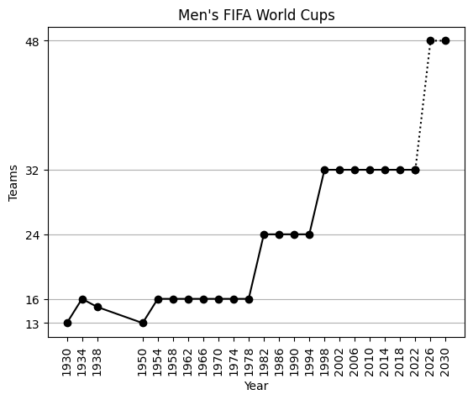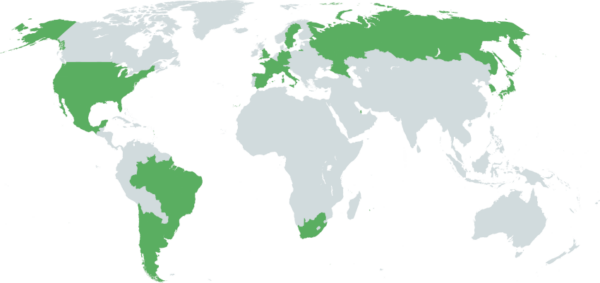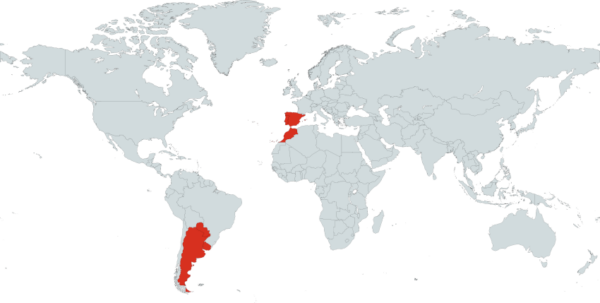World Cup: Six-country 2030 tournament is FIFA’s latest strange idea
Football’s World Cup is one of the most famous and prestigious sporting competitions in the world. An iconic household name, if you say “the World Cup” then people know what you mean – you don’t even need to specify football.
Whilst not immune to controversy, the tournament for the Jules Rimet trophy retains enduring appeal. Recent editions have captured the imagination just as much as past tournaments.
Last year’s 2022 World Cup ended with a memorable Final. Argentina and France talismans Lionel Messi and Kylian Mbappé were at their brilliant best in a 3-3 draw. Argentina then won the tournament on penalties. Some called it the greatest Final in the tournament’s history:
The Argentina-France showdown wasn’t just the greatest World Cup final of all time, it was one of the most thrilling spectacles in sports, period, and a fairytale ending for the game’s best-ever player.
— The Ringer (@ringer) Dec 18, 2022
Not satisfied, FIFA has lined up a host of changes to the tournament.
I’m sympathetic to the intent: it’s important not to stand still, to continue to improve. I also appreciate that FIFA feels confident in their plans. The governing body was widely criticised for choosing Russia and Qatar as hosts of the last two tournaments. They may feel vindicated after both tournaments proved popular with fans and analysts. However, I think some of the changes they’ve lined up seem a bit misguided. I’m not sure they are going to improve this famous tournament.
2026 World Cup: Expand to 48 Teams
The 2026 World Cup in USA, Mexico, and Canada will see the tournament expanded to 48 teams. This will be the third major expansion of the competition in its history:
FIFA will argue that every expansion of the tournament to date has been a success. The 1998 expansion to 32 teams in particular is one I would say has been brilliant for football. But that’s because this tournament structure feels to me to be the perfect size. Expanding to 48 teams is going to bring a few problems:
Hosting the tournament is more difficult
This is simply because of the number of teams and matches involved. We’re already seeing this in the bidding process for tournaments. There were only two bids to host the 2026 tournament. Whilst it’s great that Canada and Mexico are hosting this tournament, they are only co-hosts. It is difficult to imagine any but the largest and richest countries hosting a tournament on their own. This is especially true of South America and Africa where there are now few realistic hosts.
This map, with previous World Cup hosts coloured in green, already shows a clear pattern. The global south is not much involved in hosting the world’s game:

Making it logistically harder for countries to host the tournament is only going to exacerbate this issue.
Watching all or many games becomes difficult
The sheer number of games in a 48-team tournament is massive. FIFA had originally planned to solve this by using small 3-team groups in the group stage. Critics began to raise concerns with that plan however, highlighting non-simultaneous final matches and potential reduced drama compared to previous tournaments. This led FIFA to backtrack after the 2022 Final, saying that they will keep four-team groups after all.
After that concession, however, there will now be 104 matches in the tournament. I think this has the great risk of alienating fans by providing simply too much football to easily consume. The current format was great, especially for young people, to consume a feast of football. But I’m concerned that this will be too much for even the biggest appetites.
Some of the games will simply be unappealing and it risks a situation like the UEFA Champions League where a large number of group games are not of interest except to fans of the team participating.
Third-placed teams qualify from the group stage
With 48 teams split into 12 groups and a new 32-team first knockout round, it won’t be as simple as just first- and second-placed teams qualifying from a group.
Some third-placed teams will now qualify for the knockout rounds too. This is part of what is driving the large number of matches. It also means that teams can often get out of a group with just a few draws. We saw this in the 24-team 1990 World Cup. The UEFA European Championship has experienced similar issues with expanding to 24 teams. Portugal reached the Semi-Finals of Euro 2016 before they won a match in the competition.
Removing jeopardy and encouraging teams to play for draws is not a positive change. This risks reducing the drama and excitement of the early World Cup matches.
Expansion Risky
All of these factors mean that this expansion is risky. The recent 32-team tournaments have been some of the best editions. This is especially the case for the group stages. Memorable exits for bigger teams have created drama right from the start of tournaments. I think we’ve seen teams trying to win games rather than draw them and excitement has generally been high throughout.
FIFA themselves have shown they understand how good the current 32-team format is. As mentioned above, they reversed a plan to change away from 4-team groups. They’ve also adopted the 32-team format to great success in the Women’s World Cup. There are plans to use it for a revamped Club World Cup starting in 2025.
I think simple greed is distracting FIFA and leading them down a path of expansion for expansion’s sake. I worry that these changes will dilute the spectacle of a great competition.
2030 World Cup: Games in Six Countries
Last week FIFA announced some plans for the 2030 World Cup. FIFA formally awarded the tournament to a joint hosting group of Spain, Portugal, and Morocco. However, FIFA also wanted to recognise the competing bid from Uruguay, Paraguay and Argentina. That South American bid includes the hosts of the first edition in 1930, and the two teams that contested the first Final.
FIFA likes to have its cake and eat it too. Therefore, they awarded Uruguay, Paraguay and Argentina one game each as part of celebrations of the 100-year anniversary of the tournament.
The result is a plan to play games for the 2030 World Cup in six countries and on three continents. This leads to this crazy map of hosts just for this edition of the competition:

There are two obvious problems with this six-country, three-continent hosting plan:
- Critics have rightly raised that it is inconsistent with FIFA’s own climate strategy, given the number of flights involved for fans, teams and officials; and
- It doesn’t take the fan experience into account at all, with some fans expected to follow their team all around the world. This is unfortunately quite typical of FIFA’s thinking. Fans are too far down the list of valued stakeholders when decisions are made.
More Caution Needed from FIFA
I believe that FIFA need to exercise more caution with making changes to the World Cup.
It feels like FIFA are bullish and confident that their way is right. They may feel fully vindicated because much-criticised World Cups in Russia and Qatar were successful. However, there is a danger that this is leading them not to listen enough. They need to understand why people are criticising decisions. Concerns need to be properly heard and addressed, not dismissed. The voice of fans especially needs to be heard a lot more loudly.
The changes are not particularly surprising. On his re-election last year, FIFA President Gianni Infantino called for more football. But as I said at the time, more football isn’t necessarily better; the extra games need to be added in the right places.
I’m sure the 2026 and 2030 FIFA World Cups will be successful events. However, there is no guarantee that they will be better than previous editions. Change for change’s sake isn’t the right approach. FIFA are custodians of the game and I feel they need to tread very carefully to ensure they don’t have a negative impact. That applies in all areas, but it’s particularly symbolic when it comes to their flagship, most famous competition.
